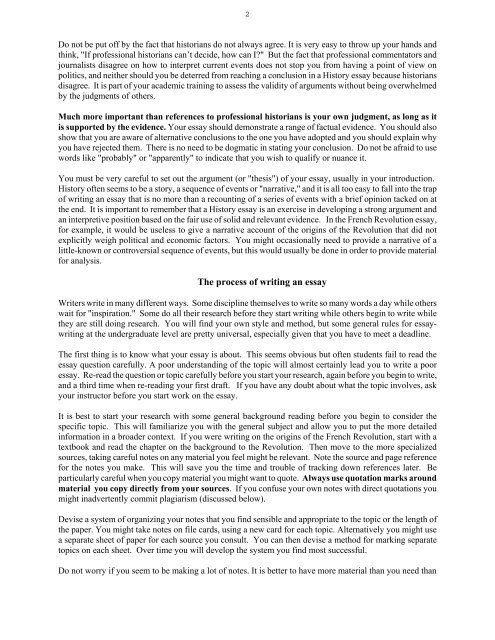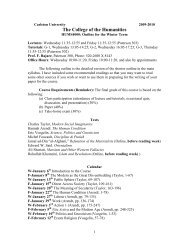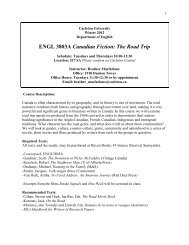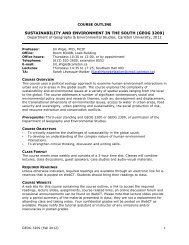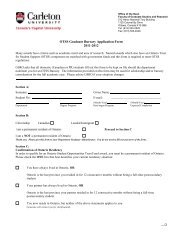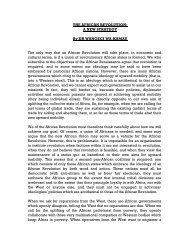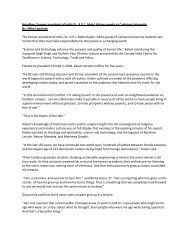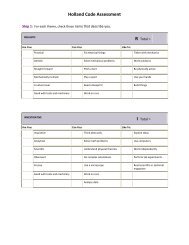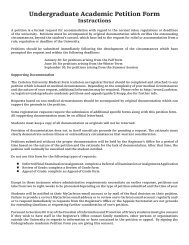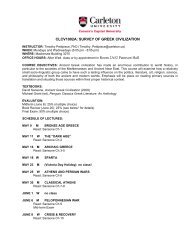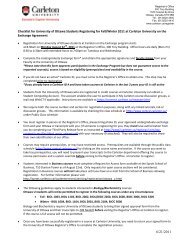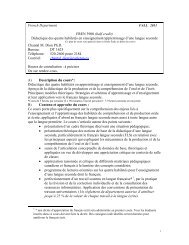Notes on writing a History essay - Carleton University
Notes on writing a History essay - Carleton University
Notes on writing a History essay - Carleton University
Create successful ePaper yourself
Turn your PDF publications into a flip-book with our unique Google optimized e-Paper software.
2<br />
Do not be put off by the fact that historians do not always agree. It is very easy to throw up your hands and<br />
think, "If professi<strong>on</strong>al historians can*t decide, how can I" But the fact that professi<strong>on</strong>al commentators and<br />
journalists disagree <strong>on</strong> how to interpret current events does not stop you from having a point of view <strong>on</strong><br />
politics, and neither should you be deterred from reaching a c<strong>on</strong>clusi<strong>on</strong> in a <strong>History</strong> <strong>essay</strong> because historians<br />
disagree. It is part of your academic training to assess the validity of arguments without being overwhelmed<br />
by the judgments of others.<br />
Much more important than references to professi<strong>on</strong>al historians is your own judgment, as l<strong>on</strong>g as it<br />
is supported by the evidence. Your <strong>essay</strong> should dem<strong>on</strong>strate a range of factual evidence. You should also<br />
show that you are aware of alternative c<strong>on</strong>clusi<strong>on</strong>s to the <strong>on</strong>e you have adopted and you should explain why<br />
you have rejected them. There is no need to be dogmatic in stating your c<strong>on</strong>clusi<strong>on</strong>. Do not be afraid to use<br />
words like "probably" or "apparently" to indicate that you wish to qualify or nuance it.<br />
You must be very careful to set out the argument (or "thesis") of your <strong>essay</strong>, usually in your introducti<strong>on</strong>.<br />
<strong>History</strong> often seems to be a story, a sequence of events or "narrative," and it is all too easy to fall into the trap<br />
of <strong>writing</strong> an <strong>essay</strong> that is no more than a recounting of a series of events with a brief opini<strong>on</strong> tacked <strong>on</strong> at<br />
the end. It is important to remember that a <strong>History</strong> <strong>essay</strong> is an exercise in developing a str<strong>on</strong>g argument and<br />
an interpretive positi<strong>on</strong> based <strong>on</strong> the fair use of solid and relevant evidence. In the French Revoluti<strong>on</strong> <strong>essay</strong>,<br />
for example, it would be useless to give a narrative account of the origins of the Revoluti<strong>on</strong> that did not<br />
explicitly weigh political and ec<strong>on</strong>omic factors. You might occasi<strong>on</strong>ally need to provide a narrative of a<br />
little-known or c<strong>on</strong>troversial sequence of events, but this would usually be d<strong>on</strong>e in order to provide material<br />
for analysis.<br />
The process of <strong>writing</strong> an <strong>essay</strong><br />
Writers write in many different ways. Some discipline themselves to write so many words a day while others<br />
wait for "inspirati<strong>on</strong>." Some do all their research before they start <strong>writing</strong> while others begin to write while<br />
they are still doing research. You will find your own style and method, but some general rules for <strong>essay</strong><strong>writing</strong><br />
at the undergraduate level are pretty universal, especially given that you have to meet a deadline.<br />
The first thing is to know what your <strong>essay</strong> is about. This seems obvious but often students fail to read the<br />
<strong>essay</strong> questi<strong>on</strong> carefully. A poor understanding of the topic will almost certainly lead you to write a poor<br />
<strong>essay</strong>. Re-read the questi<strong>on</strong> or topic carefully before you start your research, again before you begin to write,<br />
and a third time when re-reading your first draft. If you have any doubt about what the topic involves, ask<br />
your instructor before you start work <strong>on</strong> the <strong>essay</strong>.<br />
It is best to start your research with some general background reading before you begin to c<strong>on</strong>sider the<br />
specific topic. This will familiarize you with the general subject and allow you to put the more detailed<br />
informati<strong>on</strong> in a broader c<strong>on</strong>text. If you were <strong>writing</strong> <strong>on</strong> the origins of the French Revoluti<strong>on</strong>, start with a<br />
textbook and read the chapter <strong>on</strong> the background to the Revoluti<strong>on</strong>. Then move to the more specialized<br />
sources, taking careful notes <strong>on</strong> any material you feel might be relevant. Note the source and page reference<br />
for the notes you make. This will save you the time and trouble of tracking down references later. Be<br />
particularly careful when you copy material you might want to quote. Always use quotati<strong>on</strong> marks around<br />
material you copy directly from your sources. If you c<strong>on</strong>fuse your own notes with direct quotati<strong>on</strong>s you<br />
might inadvertently commit plagiarism (discussed below).<br />
Devise a system of organizing your notes that you find sensible and appropriate to the topic or the length of<br />
the paper. You might take notes <strong>on</strong> file cards, using a new card for each topic. Alternatively you might use<br />
a separate sheet of paper for each source you c<strong>on</strong>sult. You can then devise a method for marking separate<br />
topics <strong>on</strong> each sheet. Over time you will develop the system you find most successful.<br />
Do not worry if you seem to be making a lot of notes. It is better to have more material than you need than


